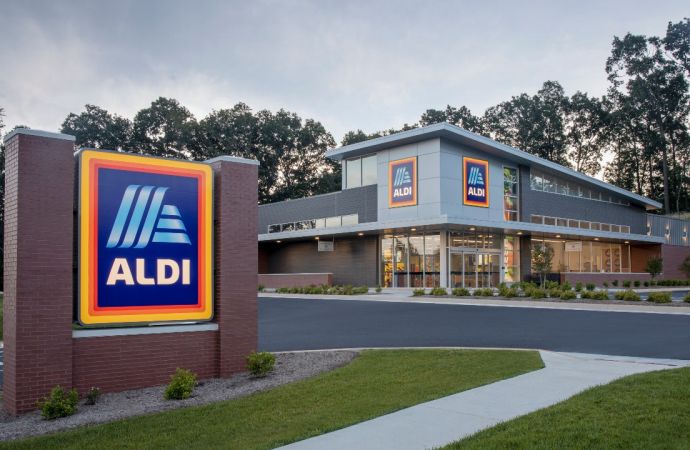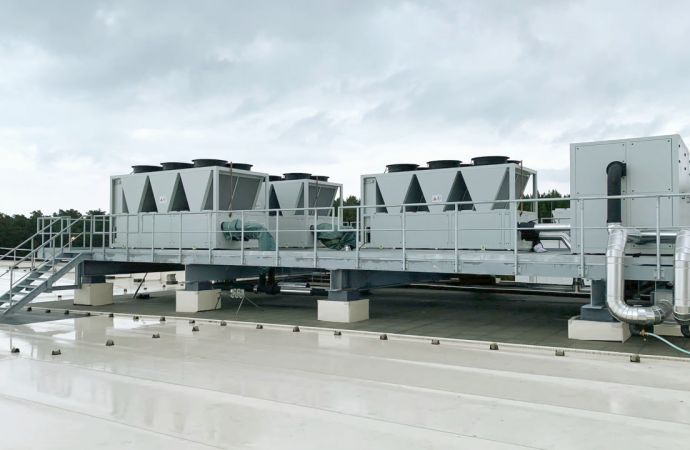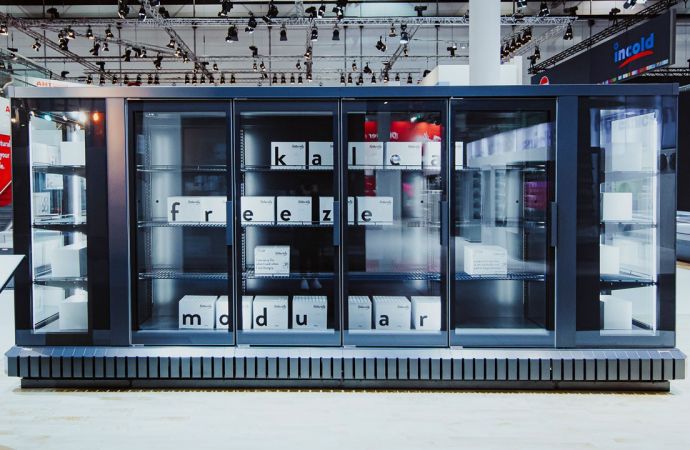The giant retail chain has installed only semi plug-in R290 cases at two stores and only plug-in cases at one store, along with R290 spot freezers at most stores.

While most of the natural refrigerant systems that Batavia, Illinois-based ALDI US has been installing are transcritical CO2 (R744), the chain is also testing full-store propane (R290) refrigeration display cases at a handful of stores as well.
To date, ALDI US, a division of German retail giant ALDI Süd that operates more than 2,000 stores across 36 U.S. states, has installed only R290 self-contained semi plug-in display cases with a glycol loop to remove heat of condensation at two stores, and only R290 air-cooled plug-in cases at one store, according to Dan Gavin, Vice President of Real Estate at ALDI US. One of the semi plug-in stores is in California and is supported by a state incentive program.
In addition, three ALDI US stores are using a combination of R290 and R448A systems for multi-deck cooler units. Most ALDI US stores using central refrigeration systems also employ eight to 10 freezer spot merchandiser units that operate on R290.
On the CO2 side, 423 stores now use transcritical CO2 systems, Gavin said, the most of any supermarket chain in the U.S. ALDI employs heat reclaim from the transcritical CO2 systems for space heating that is incorporated into a store's air conditioning system.
Approximately 380 of the transcritical CO2 systems have been provided by Hillphoenix, said Gavin. The remaining natural refrigerant systems have been supplied by AHT, Zero Zone, Hussmann and Kysor Warren.
Though most of its natural refrigerant stores use transcritical CO2, ALDI US plans to continue to test R290 semi plug-in cases with glycol loop in select stores, in partnership with AHT, said Gavin.
“Given this early stage of development, we will continue to use both types [CO2 and R290] , but we are always reevaluating our approach to ensure greatest impact,” he noted. “We may find that a combination of solutions is necessary based on climate zone.”
ALDI US also uses a natural refrigerant (ammonia/R717) at all of its 25 U.S. warehouses.
GreenChill certification leader
Gavin noted that 429 ALDI US stores, many with natural refrigerants, will have received platinum certification from the U.S. Environmental Protection Agency’s GreenChill program by July. Platinum certification, the highest level, is awarded to stores that are using ultra-low-GWP refrigerants or have substantially reduced refrigerant emission and charge. Of the 429 stores, 273 are newly constructed and 156 are remodeled stores.
In 2020, ALDI US earned “more EPA GreenChill store certifications than any supermarket chain has ever earned in their entirety, and we are incredibly proud of that achievement,” said Gavin. “But we’re not stopping there. We’re committed to continuing to convert even more stores to natural refrigerants, and aim to maintain our status as an industry leader in this important sustainability effort.”
All told, ALDI US has invested more than $5 billion to remodel existing stores and open new ones. In 2020, ALDI US remodeled 16 stores to include natural refrigerants, and is on track to remodel at a minimum approximately 25 more stores this year, Gavin said. Included in this investment are environmentally friendly building upgrades, including use of more environmentally friendly refrigerants for the expanded refrigeration sections of the stores.
“We are committed to the natural refrigerant program in new and remodeled stores in northern climates and continually trialing new technologies for more challenging climate zones,” he noted.
In California, where next year new refrigeration systems with more than 50lbs (22.7kg) of refrigerant must use a refrigerant with a GWP lower than 150, ALDI US’s stores are already utilizing CO2 or R290, and its warehouse is using ammonia, in line with the regulation. Two California stores with CO2 are testing parallel compression and gas ejectors to enhance the efficiency of the transcritical systems in warm climates, the only ALDI US stores doing so. Other stores use adiabatic gas coolers for efficiency improvement.
ALDI has installed transcritical CO2 in other warm regions of the U.S., including Florida, Texas and Georgia. “There have been energy studies completed at these stores, which have not been a deterrent to CO2 and propane,” said Gavin.
In transitioning its chain to natural refrigerants, ALDI US has designed a training process “to be as smooth and as seamless as possible for our employees and technicians,” said Gavin. “We provide resources to help mitigate any potential issues they may face during the transition.”
Additionally, ALDI US works closely with its equipment suppliers to ensure that its supply chain remains capable of “handling the needs of the business and our customers,” he said. “We have been able to minimize disruption and have been able to continue transitioning more stores to the use of natural refrigerant systems.”
Asked to explain why ALDI US has been proactive in deploying natural refrigerant systems, Gavin replied, “Sustainability is a key driver in our business, and we take our responsibility to protect the planet and its resources very seriously. Additionally, we know sustainability is important to our shoppers.”
We’re committed to continuing to convert even more stores to natural refrigerants, and aim to maintain our status as an industry leader in this important sustainability effort.”
– Dan Gavin, ALDI US
Related stories




